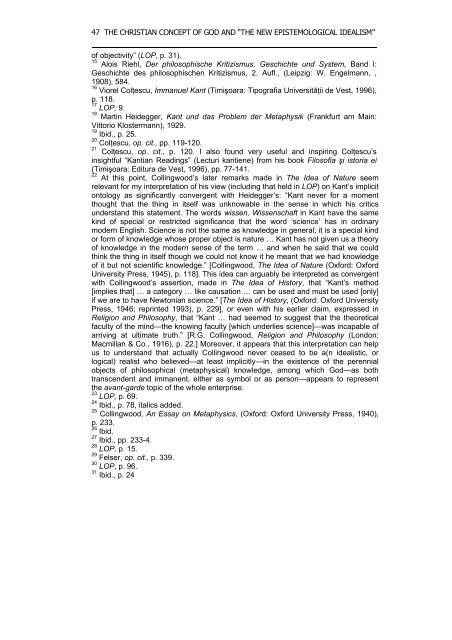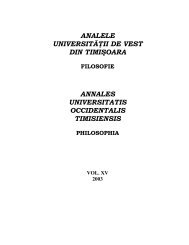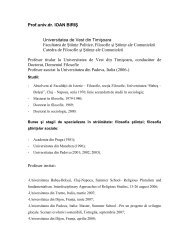VOL. IV (XXI) 2009 - Departamentul de Filosofie si Stiinte ale ...
VOL. IV (XXI) 2009 - Departamentul de Filosofie si Stiinte ale ...
VOL. IV (XXI) 2009 - Departamentul de Filosofie si Stiinte ale ...
You also want an ePaper? Increase the reach of your titles
YUMPU automatically turns print PDFs into web optimized ePapers that Google loves.
47 THE CHRISTIAN CONCEPT OF GOD AND “THE NEW EPISTEMOLOGICAL IDEALISM”<br />
of objectivity” (LOP, p. 31).<br />
15 Alois Riehl, Der philosophische Kritizismus. Geschichte und System, Band I:<br />
Geschichte <strong>de</strong>s philosophischen Kritizismus, 2. Aufl., (Leipzig: W. Engelmann, ,<br />
1908), 584.<br />
16 Viorel Colţescu, Immanuel Kant (Timişoara: Tipografia Univer<strong>si</strong>tăţii <strong>de</strong> Vest, 1996),<br />
p. 118.<br />
17 LOP, 9.<br />
18 Martin Hei<strong>de</strong>gger, Kant und das Problem <strong>de</strong>r Metaphy<strong>si</strong>k (Frankfurt am Main:<br />
Vittorio Klostermann), 1929.<br />
19 Ibid., p. 25.<br />
20 Colţescu, op. cit., pp. 119-120.<br />
21 Colţescu, op. cit., p. 120. I also found very useful and inspiring Colţescu’s<br />
in<strong>si</strong>ghtful “Kantian Readings” (Lecturi kantiene) from his book Filosofia şi istoria ei<br />
(Timişoara: Editura <strong>de</strong> Vest, 1996), pp. 77-141.<br />
22 At this point, Collingwood’s later remarks ma<strong>de</strong> in The I<strong>de</strong>a of Nature seem<br />
relevant for my interpretation of his view (including that held in LOP) on Kant’s implicit<br />
ontology as <strong>si</strong>gnificantly convergent with Hei<strong>de</strong>gger’s: “Kant never for a moment<br />
thought that the thing in itself was unknowable in the sense in which his critics<br />
un<strong>de</strong>rstand this statement. The words wissen, Wissenschaft in Kant have the same<br />
kind of special or restricted <strong>si</strong>gnificance that the word ‘science’ has in ordinary<br />
mo<strong>de</strong>rn English. Science is not the same as knowledge in general; it is a special kind<br />
or form of knowledge whose proper object is nature … Kant has not given us a theory<br />
of knowledge in the mo<strong>de</strong>rn sense of the term … and when he said that we could<br />
think the thing in itself though we could not know it he meant that we had knowledge<br />
of it but not scientific knowledge.” [Collingwood, The I<strong>de</strong>a of Nature (Oxford: Oxford<br />
Univer<strong>si</strong>ty Press, 1945), p. 118]. This i<strong>de</strong>a can arguably be interpreted as convergent<br />
with Collingwood’s assertion, ma<strong>de</strong> in The I<strong>de</strong>a of History, that “Kant’s method<br />
[implies that] … a category … like causation … can be used and must be used [only]<br />
if we are to have Newtonian science.” [The I<strong>de</strong>a of History, (Oxford: Oxford Univer<strong>si</strong>ty<br />
Press, 1946; reprinted 1993), p. 229], or even with his earlier claim, expressed in<br />
Religion and Philosophy, that “Kant … had seemed to suggest that the theoretical<br />
faculty of the mind—the knowing faculty [which un<strong>de</strong>rlies science]—was incapable of<br />
arriving at ultimate truth.” [R.G. Collingwood, Religion and Philosophy (London:<br />
Macmillan & Co., 1916), p. 22.] Moreover, it appears that this interpretation can help<br />
us to un<strong>de</strong>rstand that actually Collingwood never ceased to be a(n i<strong>de</strong>alistic, or<br />
logical) realist who believed—at least implicitly—in the existence of the perennial<br />
objects of philosophical (metaphy<strong>si</strong>cal) knowledge, among which God—as both<br />
transcen<strong>de</strong>nt and immanent, either as symbol or as person—appears to represent<br />
the avant-gar<strong>de</strong> topic of the whole enterprise.<br />
23 LOP, p. 69.<br />
24 Ibid., p. 78, italics ad<strong>de</strong>d.<br />
25 Collingwood, An Essay on Metaphy<strong>si</strong>cs, (Oxford: Oxford Univer<strong>si</strong>ty Press, 1940),<br />
p. 233.<br />
26 Ibid.<br />
27 Ibid., pp. 233-4.<br />
28 LOP, p. 15.<br />
29 Felser, op. cit., p. 339.<br />
30 LOP, p. 96.<br />
31 Ibid., p. 24




